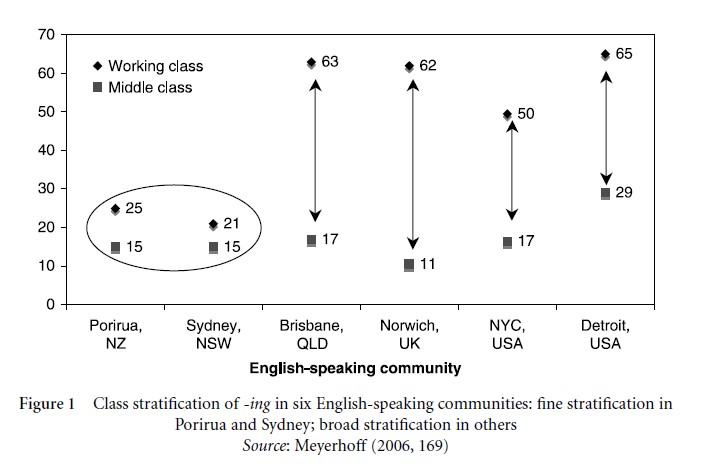What is Ethnography of Communication
What are the means of communication used by people when they conduct their everyday lives; and what meanings does this...
Read More
Gaze in Interaction
When communicators interact with one another, they necessarily gaze (or look) at each other or gaze separately or together at...
Read More
Gender and Discourse
Scholarship on gender and discourse has a long, interdisciplinary history. Anthropologists in the seventeenth and eighteenth centuries documented differences between...
Read More
Gestures in Discourse
The communicative roles of gestures during talk in interaction are partly a function of their placement within unfolding turns and...
Read More
Erving Goffman
Erving Goffman was a sociologist, but what he studied was communication. He established the “interaction order” as a legitimate topic...
Read More
Identities and Discourse
Social scientists are not interested in identity in the sense of an individual’s unique name and address. They are interested...
Read More
Interactional Sociolinguistics
Interactional sociolinguistics is concerned with how speakers signal and interpret meaning in social interaction. The term and the perspective are...
Read More
Intimate Talk with Family and Friends
Intimate talk with family and friends can be examined as a product, process, or resource. It is a product of...
Read More
Language and Social Psychology
Social psychology is conventionally defined as the scientific study of how the actual or imagined presence of others influences an...
Read More
Language Varieties
The term “language varieties” covers “language” and “dialect.” A variety may be characteristic of a particular social group, or associated...
Read More
Cross-Training
Cross-training, also known as multiskilling or multiskill training, is a movement in the training industry prompted by the increase in...
Read More
Crossover Effect
Recently, researchers have turned their attention to the phenomenon of stress contagion that has been labeled crossover, namely, the reaction...
Read More
Culture and Careers
Culture is defined as the beliefs and values that shape the customs, norms, and practices of groups of people that...
Read More
Customized Careers
Customized careers are unconventional patterns of workforce engagement by individuals who would ordinarily be expected to adhere to traditional career...
Read More
Domestic-Partner Benefits
Employers around the globe are increasingly recognizing their employees’ domestic partnerships as a basis for extending human resource benefits. The...
Read More
Early Career Stage
One of the most important milestones in an individual’s life and career is the transition from school to work. Much...
Read More
Elder Care Practices
The term elder care describes the unpaid help provided by family members, friends, and/or neighbors to frail or disabled elders,...
Read More
Electronic Employment Screening
Electronic employment screening (EES) is preemployment assessment using any electronic hardware or software, including the Internet. EES is typically conducted...
Read More
Employee Assistance Programs
Employee assistance programs (EAPs) function to treat a variety of work- and nonwork-related problems that may interfere with an employee’s...
Read More
Employment-At-Will Doctrine
The employment-at-will doctrine governs employment contracts of an unspecified duration. The doctrine’s classic formulation holds that absent a clear intention...
Read More
Neolithic Cultures
The term Neolithic is frequently used to refer to that stage in humanity’s history when people became sedentary and started...
Read More
Neurotheology
Neurotheology is the scientific study of religious or spiritual experiences and feelings. By using psychology and neuroscience, scientists explore the...
Read More
Friedrich Nietzsche
The German thinker Friedrich Nietzsche presented scathing criticisms of the human sociocultural world (particularly religion and theology) and called for...
Read More
Non-Darwinian Evolutionary Mechanisms
Charles Darwin was never entirely satisfied with the evolutionary role he originally gave to natural selection in On the Origin...
Read More
Kenneth Page Oakley
Kenneth Page Oakley was born on April 7, 1911 in Amersham, England. He received an undergraduate degree in geology in...
Read More
Parenting Satisfaction Scale (PSS)
Child rearing has always been one of life’s major challenges and potential sources of self-fulfillment. In today’s world, divorce and...
Read More
Parenting Stress Index (PSI)
The Parenting Stress Index (PSI), developed by Richard Abidin in 1976, is a screening and diagnostic assessment tool commonly used...
Read More
Parole Decisions
Parole decisions have important implications. For prisoners, such decisions mean early release or define the conditions of release. For the...
Read More
Patient’s Rights
Patients who are subjected to involuntary hospitalization in a psychiatric facility or who accept voluntary admission retain certain rights within...
Read More
Pedophilia
Pedophilia, a sexual preference for prepubescent children, appears early in life, is stable over time, and directs the person’s sexuality...
Read More
Personal Injury and Emotional Distress
Personal injury and emotional distress claims are civil court matters in which psychologists may become involved in several ways. A...
Read More
Personality Disorders
Personality disorders, formerly known as character disorders, make up a class of heterogeneous mental disorders characterized by chronic, maladaptive, and...
Read More
Plea Bargaining
Plea bargaining is a process in a criminal case whereby the defendant agrees with the prosecutor to plead guilty (or...
Read More
Police Eyewitnesses
Criminal cases often hinge on the testimony of eyewitnesses; sometimes those eyewitnesses are police officers. Police eyewitnesses perform the same...
Read More
Police Decision Making
Police officers are gatekeepers of the criminal court system and must make a number of critical decisions during their interactions...
Read More
Deception in Discourse
The “truth-bias,” the expectation that, normally, one tells the truth, is proposed to be the cornerstone of humanity (Bok 1978)....
Read More
Directives
Directives were described by Searle (1975) as one of five basic speech acts. In his approach, taken from linguistic philosophy,...
Read More
Cognitive Approaches to Discourse
Most Language and Social Interaction (LSI) researchers would agree that their findings about the social functionality of details of language...
Read More
Discourse in the Law
The law operates primarily through language. Legislative bodies enact statutes and ordinances, judges hand down decisions, juries issue verdicts, and...
Read More
Discourse Markers
Using language – “languaging” (Becker 1988) – is possible at two levels of discourse. Generally, when we use language, we...
Read More
Discursive Psychology
Discursive psychology examines how psychological issues are made relevant and put to use in everyday talk. Unlike traditional psychological perspectives,...
Read More
Doctor–Patient Talk
The world’s leading medical schools and journals officially recognize that what doctors and patients say to each other, and how...
Read More
Emotion and Discourse
Human emotionality is an ongoing stream that pervades every aspect of social life, talk, conversation, and discourse. Emotions are appraisals...
Read More
English-Only Movements
English-only movements seek to establish English as the official language of a nation, part of a nation, or a colony....
Read More
Ethnomethodology
Harold Garfinkel introduced the term “ethnomethodology” (by analogy to “ethnoscience”) in the 1950s and 1960s and gave the approach its...
Read More

















































